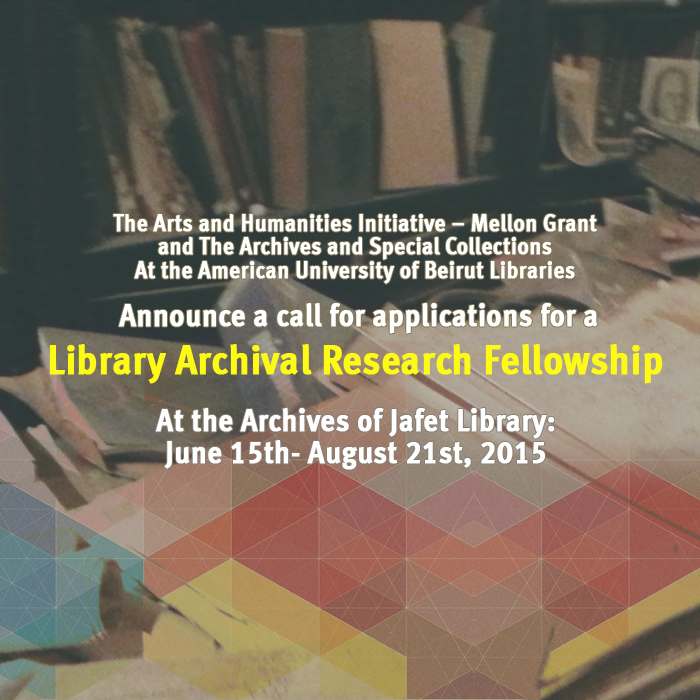The Arts and Humanities Initiative Mellon Grant and The Archives and Special Collections at Jafet Library At the American University of Beirut Announce a call for applications for
Library Archival Research Fellowship
At the Archives of Jafet Library:
June 15th- August 21st, 2015
The American University of Beirut Libraries and the Arts and Humanities Initiative (Mellon Grant) at AUB are offering a short-term Summer Archival Research Fellowship to encourage scholarly engagement with one of two of the following AUB Libraries’ Special Collections: The AUB Libraries’ Arabic Manuscripts Collection, and the Constantine Zurayq’s Archival Papers (around 18.4 linear feet).
The fellowship seeks to support the production of scholarly work around these collections and enhance their cataloging and accessibility, as well as promote the community’s knowledge of the AUB Library Archival holdings in general.
The Research Fellow will be given access to our Library collections, as well as a space to work, in addition to a stipend of 2,000 USD. For international fellows, an additional stipend to cover the costs of travel will be provided. All applicants, local and international, will be responsible for booking their own lodging, airline tickets, and securing their visas, if needed. The Fellowship will cover six to eight weeks any time between June 15th and August 21st. Expected outcomes, description of tasks, research priorities and required documents for applying are further detailed below:
Research Priorities & Description of Collections and Tasks
Collection A: The AUB Manuscripts Collection:
The University Libraries owns approximately 1,400 manuscripts in several languages, the majority of which are in Arabic. The core clusters were acquired from the prestigious private libraries of the Syrian Society for the Arts and Sciences (1847- 1852); the distinguished linguist and scholar Nawfal Nimatallah Nawfal’s (1811-1887) and the prominent Lebanese historian Issa Iskandar al-Ma’luf (1869-1956). The manuscripts cover a wide range of subjects, e.g. theology, Arabic language and literature, history, geography and the various sciences, and attract researchers from all over the world. For a detailed description of our collection please refer to the catalog compiled by Dr. Yusuf Khoury.
Prospective Fellows working on this collection are expected to spend six to eight weeks at the Libraries, and depending on their research interest and the Libraries’ priorities, will be required to perform one or more of the following tasks:
- Conduct an in-depth scholarly description of the collection, or a section thereof, highlighting its scholarly value for the research community;
-
Conduct a critical assessment of the physical condition of the manuscript collection;
-
Focus on a subset of the manuscript collection, or on one or several items and write a thorough description, a critical paper, or a codicological description of the item(s) in question;
-
Contribute to re-cataloging part of the collection, by contributing a more in depth description of the items of interest.
Collection B: The Constantine Zurayq Papers:
A leading intellectual, historian, diplomat, educator, and among the earliest Arab nationalists, Dr. Zurayk was a prominent AUB Faculty member (1930-1977). He served as AUB’s Acting President between1946 and1950, and as Dean of Faculties between 1952 and 1954. He was also the Rector of the University of Damascus between 1949 and 1952. An international figure, he was First Counselor at the Syrian delegation in Washington DC in 1945-46 and served as Minister of Syria in Washington for two years (1946-47), and was also a delegate to the United Nations Between1965 and 1977, Dr. Zurayk held several visiting professorships at Columbia and Georgetown Universities and the University of Utah. The collection of his personal papers, which was donated by his family to the AUB Libraries, comprises around 55 archival boxes (18.4 linear feet).
-
Prospective Fellows working on this collection are expected to spend between six and eight weeks at the Libraries, and depending on their research interest and the Libraries’ priorities, will be required to perform one or more of the following tasks:
-
Assist in archiving, describing and arranging a section the collection related to the Fellow’s area of interest and research;
-
Conduct research part of the collection with the aim of producing an academic paper related to one or several historical and scholarly aspects of the collection (highlighting and taking into account the archival component| of the collection as compiled by Dr. Zurayq);
-
Assist in organizing potential outreach efforts around the Zurayq Collection (help in the curation of a related exhibit)
Eligibility & Application
Faculty, Graduate Students, Librarians, and/or researchers/ adjuncts, and independent researchers are encouraged to apply. The required documents for the application are as follows:
-
An up-to-date resume;
-
A cover letter clearly indicating which collection you’re interested in;
-
A research proposal (500-1,000 words) describing the applicant’s research interest and its relevance to one of the collections at hand;
-
Two recommendation letters from an academic referee to be sent directly to the email below;
-
A proof of Arabic proficiency (or other languages relevant to the manuscript(s) to be tackled).
Applications must be received no later than Sunday May 31st, 2015, and must be submitted electronically to the Archives and Special Collections at the following address: asc@aub.edu.lb, with the subject line “Library Archival Research Fellowship”.
